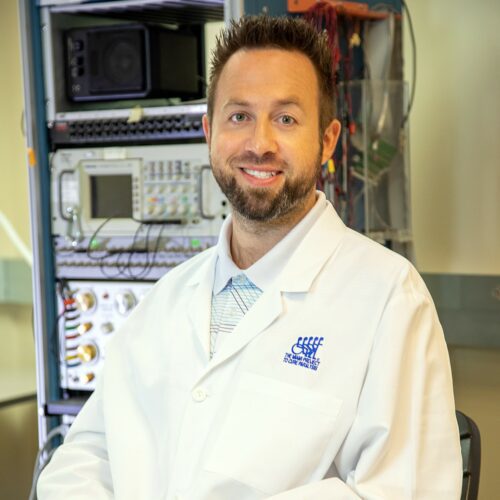Patrick D. Ganzer, Ph.D.
Assistant Professor, Department of Biomedical Engineering

The Miami Project to Cure Paralysis
1095 NW 14th Terrace
Miami, FL 33136
Biography
Research Interests
Areas Of Research
Publications
More
Patrick D. Ganzer, Ph.D. is currently an Assistant Professor at the University of Miami (jointly appointed at The Miami Project to Cure Paralysis and the Department of Biomedical Engineering). He received his undergraduate degree in 2008 from King’s College (Pennsylvania; Summa Cum Laude). In 2013, he received his Ph.D. from Drexel University, conducting biomedical engineering and neuroscience research in preclinical models of spinal cord injury (main mentor: Dr. Karen Moxon; co-mentor: Dr. Jed Shumsky). Dr. Ganzer then completed his postdoctoral fellowship in 2017 at the University of Texas at Dallas and the Texas Biomedical Device Center with Drs. Robert Rennaker and Michael Kilgard (research focused on enhancing neuroplasticity after sensorimotor injury using targeted vagus nerve stimulation).
Dr. Ganzer also has significant experience researching and developing neurotechnology in industry, working at Battelle Memorial Institute from 2017-2021 in the Medical Devices and Neuromodulation division. At Battelle (the world’s largest non-profit research organization), Dr. Ganzer & team won ‘Idea Of The Year’ in 2019 and ‘Publication Of The Year’ in 2020. Dr. Ganzer was also PI for both the Bioelectronic Medicine program funded internally at Battelle and the N^3 program funded by DARPA. He received the prestigious Kumar New Investigator Award from The North American Neuromodulation Society in 2022. Dr. Ganzer’s neurotechnology teams have translated their work to multiple clinical trials, published in several high impact journals (e.g., Cell, Nature Communications, Science Advances, Nature Human Behavior, and eLife), and have received multiple awards for their impact on the field of translational neurotechnology.
Neural Engineering, Brain-Computer Interfaces, Bioelectronic Medicines and Machine Learning
Our overall research is focused on developing neurotechnology to treat disease and dysfunction. Our preclinical research focuses on using neuromodulation to promote neuroplasticity of damaged control systems and subsequent recovery. Here we use a variety of techniques including brain mapping, 2-photon microscopy, optogenetics, transsynaptic tracing, tissue clearing, nerve stimulation, and awake-behaving physiological recordings. Our clinical research compliments these preclinical studies and is conducted at the nationally ranked Christine E. Lynn Rehabilitation Center located on the Miller School of Medicine campus. Importantly, several of our efforts are in various stages of clinical testing to help promote recovery of lost function in patients.
PROFESSIONAL AFFILIATIONS/MEMBERSHIPS
- Society for Neuroscience
